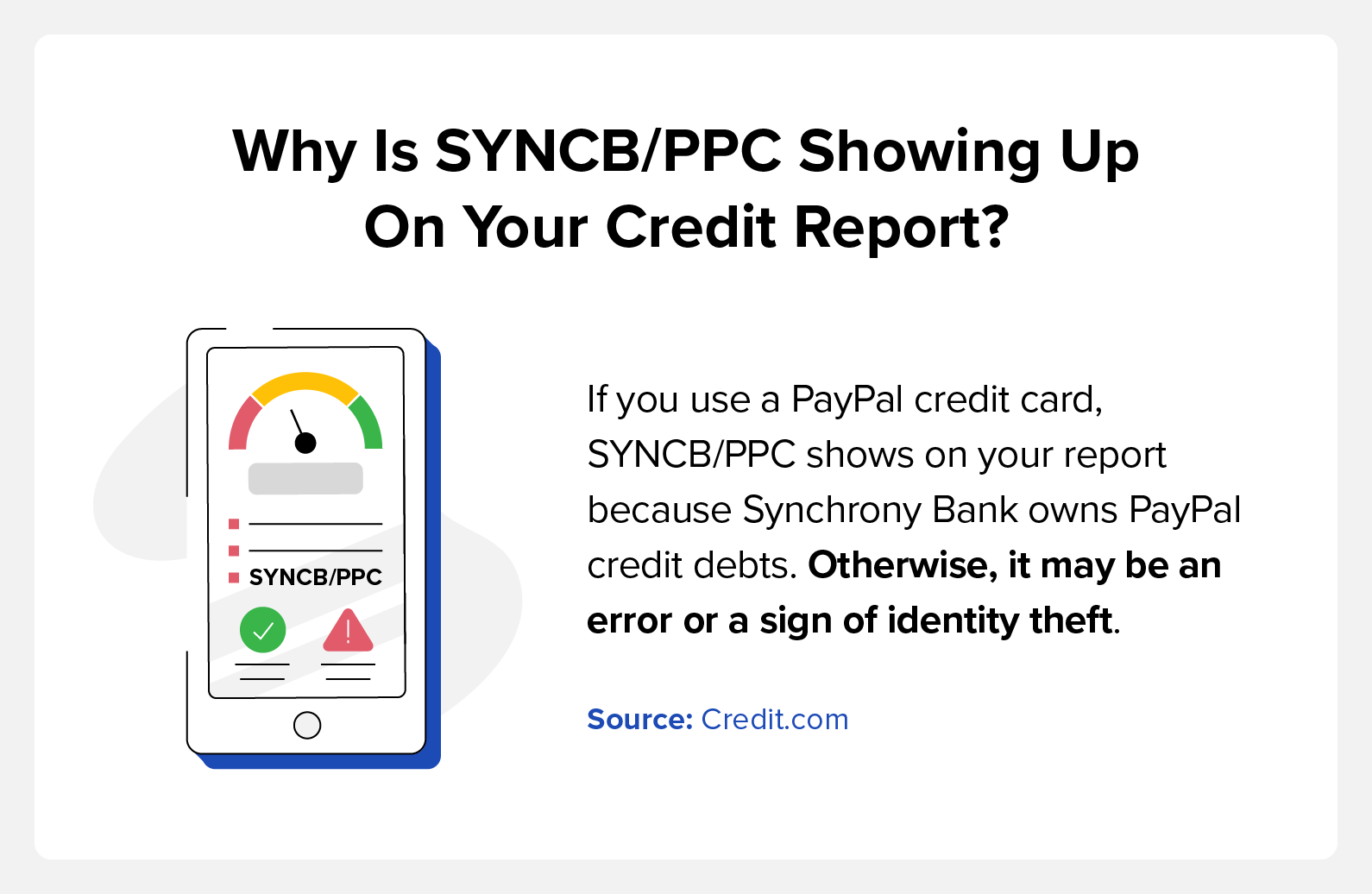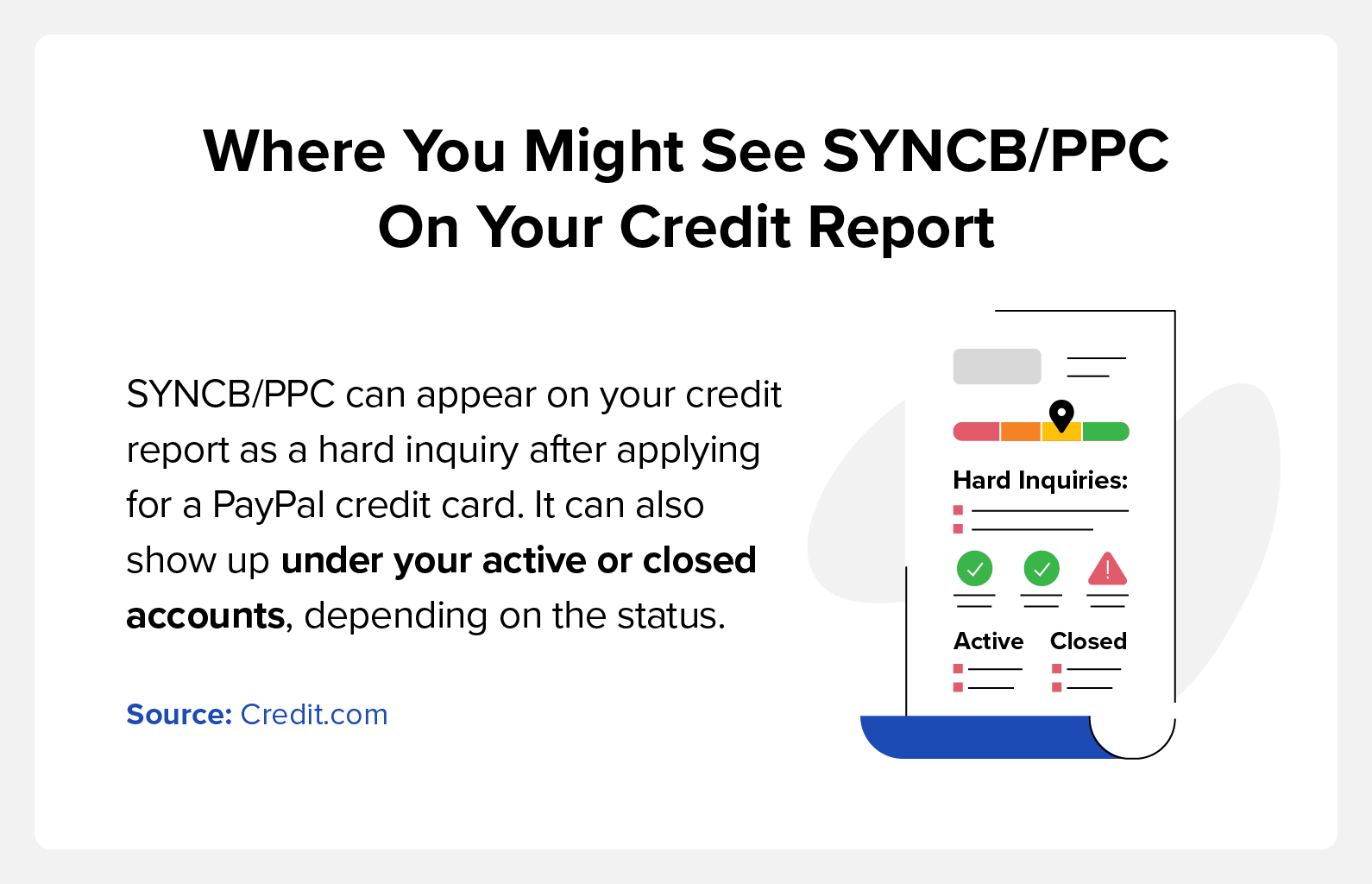
Many or all of the products featured here are from our partners who compensate us. This may influence which products we write about and where and how the product appears on a page. However, this does not influence our evaluations.
SYNCB/PPC will show up on your credit report if you have a PayPal credit card, and it’s an acronym for Synchrony Bank/PayPal Credit. If you don’t have a PayPal Credit account, SYNCB/PPC on your credit report may be due to identity theft.
Your credit report is the key to your credit health and where you should turn for information about your credit activity. When looking at your credit report or a credit card statement, you may see SYNCB/PPC and are unsure what it is. It’s alarming to find something on a report or statement that is unfamiliar, and while this may be an error, it may also be completely normal.
Today, you’ll learn what SYNCB/PPC is, why it appeared on your credit report, and how to remove it if it’s an error. By understanding your credit report and checking it regularly, you’ll be in a better position to maintain a good credit score and potentially improve it.
Table of contents:
What Is SYNCB/PPC?
SYNCB/PPC is an acronym for Synchrony Bank/PayPal Credit. If you use PayPal, PayPal offers lines of credit, previously called “Bill Me Later.” If you have a PayPal account, you can apply for a PayPal credit card, and this will then start showing up on your credit reports.
In November 2017, PayPal announced that it reached an agreement to sell consumer credit receivables to Synchrony Bank. This included the debts that customers owed PayPal at the time via their lines of credit. Synchrony Bank now reports account activity to the major credit bureaus, which then shows up on your credit report.

Why Is SYNCB/PPC on Your Credit Report?
Whether you’re paying down debts or using your credit card, SYNCB/PPC will appear on your credit report. In many cases, SYNCB/PPC showing on your credit report is completely normal if you have a PayPal credit card (PPC) or recently applied for one. Now that Synchrony Bank owns the debts, you may see SYNCB/PPC in different areas of your credit report.
Hard Inquiries
Once you apply for a PayPal credit card or any other credit card, a hard inquiry will show up on your credit report. A hard inquiry is when a credit card issuer or other institution that requires a credit application checks your credit history. Your credit report gives them an idea of whether or not it’s a high risk to lend you money.
Hard inquiries can negatively impact your credit score, but it’s temporary. This happens because credit bureaus use the following factors to determine your score:
- Payment history
- Credit utilization
- Credit age
- Credit mix
- New accounts
Hard inquiries fall under the new accounts category for your credit. It’s often a red flag to lenders if a person regularly applies for new lines of credit. So, if you didn’t apply for a new credit account with PayPal but see a hard inquiry, it’s a good idea to dispute it as soon as possible. An erroneous hard inquiry is either an error from the credit institution or a sign of identity theft.
Active or Closed Accounts
SYNCB/PPC may also show up on your credit report if you have an active or closed account. Once you open a credit card account, you will begin seeing it as an active account on your credit report. This helps keep track of your credit age, payment history, and more. As Synchrony Bank reports your payment history, this can raise or lower your score depending on your on-time payments.
Your credit age accounts for 15% of your credit score because lenders want to see how much experience you have managing credit. Active accounts can help improve your credit score as they get older, but closing an account can decrease your score because it’s no longer accumulating time. A closed credit account can also affect your credit utilization ratio.

How to Remove an SYNCB/PPC Error From Your Credit Report
If you’re seeing SYNCB/PPC on your credit report and it’s an error, start taking steps to address it. Again, this may mean that you have become a victim of identity theft—meaning a cybercriminal could run up your debts and negatively impact your credit and overall financial well-being.
Should this happen to you, you can take the following steps:
- Freeze your credit: A temporary credit freeze prevents lenders from accessing your credit report.
- Contact the fraud department: You can report the fraud to PayPal’s fraud department. They can help you take action to cancel the credit card and help you deal with outstanding transactions.
- Check your credit report: There may be additional irregularities on your credit report, so review it thoroughly. You can get your free credit report at AnnualCreditReport.com once per year.
- Challenge and Dispute fraud or errors with the credit bureaus: If there are errors or fraud on your credit report, write a credit dispute letter to request that the credit bureaus verify and correct them.
- Set up fraud alerts: Once resolved, one of the best things you can do to prevent this from happening again is to set up credit monitoring and fraud alerts. This way, you’ll have some protection and be notified should anything happen.
Through Credit.com’s ExtraCredit® service, you can set up credit monitoring and identity theft insurance for some additional peace of mind.

Does SYNCB/PPC Improve or Harm Your Credit Score?
SYNCB/PPC on your credit report can help and harm your credit score, depending on the situation. If you sign up for a PayPal credit card account, make your payments on time, and keep your credit utilization low, it can help boost your score. However, late or missed payments and SYNCB/PPC errors on your credit report could hurt your score.
If you want to avoid potential identity theft, sign up for Credit.com’s ExtraCredit service. You can also check your credit health by signing up for your free credit report card today.


